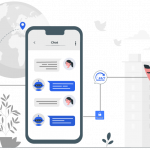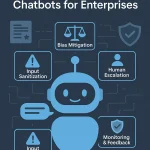In today's fast-paced digital world, the travel industry is continuously evolving, driven by the need for efficiency, personalized customer service, and round-the-clock assistance. One of the most transformative innovations in this sector is the advent of travel chatbots. These AI-driven conversational agents are not just enhancing customer experience but are also … [Read more...] about The Evolution of Travel Chatbots: Revolutionizing the Travel Industry
Artificial Intelligence
Learn about the latest developments in artificial intelligence and how it is transforming industries around the world. Our website offers insights and resources for understanding AI and its applications.
From Prompt to Policy: Building Ethical GenAI Chatbots for Enterprises
I. Introduction: The Double-Edged Sword of GenAI The development of enterprise automation through Generative AI (GenAI) enables virtual assistants and chatbots to understand user intent, so they can create suitable responses and predictive actions. The promising benefits of continuous intelligent interaction at scale create multiple ethical challenges that include biased … [Read more...] about From Prompt to Policy: Building Ethical GenAI Chatbots for Enterprises
Small language models (SLMs): a Smarter Way to Get Started with Generative AI
TL;DR Small language models (SLMs) are optimized generative AI solutions that offer cheaper and faster alternatives to massive AI systems, like ChatGPT Enterprises adopt SLMs as their entry point to generative AI due to lower training costs, reduced infrastructure requirements, and quicker ROI. These models also provide enhanced data security and more reliable outputs. Small … [Read more...] about Small language models (SLMs): a Smarter Way to Get Started with Generative AI
AI’s Achilles’ Heel: The Data Quality Dilemma
As AI has gained prominence, all the data quality issues we've faced historically are still relevant. However, there are additional complexities faced when dealing with the nontraditional data that AI often makes use of. AI Data Has Different Quality Needs When AI makes use of traditional structured data, all the same data cleansing processes and protocols that have been … [Read more...] about AI’s Achilles’ Heel: The Data Quality Dilemma
How Fuzzy Matching and Machine Learning Are Transforming AML Technology
Traditional anti money laundering systems rely on static thresholds and fixed rules to detect suspicious behavior. These approaches often produce high false positive rates, creating operational friction and excessive workloads. The Financial Action Task Force has emphasized that digital transformation in AML is no longer optional. Their guidance encourages financial … [Read more...] about How Fuzzy Matching and Machine Learning Are Transforming AML Technology
What is artificial intelligence (AI)?
AI refers to the development of computer systems that are able to perform tasks that normally require human intelligence, such as recognizing patterns, learning from experience, and problem-solving.
AI systems can be trained to perform these tasks through the use of algorithms and machine learning techniques, which allow them to analyze and interpret data and make decisions based on that analysis. AI has the potential to significantly improve the efficiency and accuracy of many tasks, and is being applied in a wide range of industries and applications.
How is artificial intelligence used?
AI is used in a variety of industries, including healthcare, finance, retail, and transportation, to improve efficiency and productivity.
For example, in healthcare, AI can be used to analyze medical images or electronic health records to identify patterns and make diagnoses, while in finance, it can be used to identify fraudulent activity or optimize investment strategies. In retail, AI can be used to personalize customer experiences or predict demand for products.
What are some examples of artificial intelligence?
Examples of AI include self-driving cars, language translation software, and virtual assistants like Apple’s Siri or Amazon’s Alexa.
Other examples include chatbots that can handle customer service inquiries, predictive analytics tools that can forecast future outcomes, and recommendation engines that can suggest products or content based on user preferences.
What are the potential risks and benefits of artificial intelligence?
AI has the potential to revolutionize industries and improve our daily lives, but it also raises ethical concerns and the risk of job displacement. One concern is the potential for AI systems to perpetuate or amplify biases present in the data used to train them, leading to unfair or discriminatory outcomes.
There is also the risk that AI could be used to automate tasks or make decisions that have negative consequences for humans.
On the other hand, the benefits of AI include improved efficiency and accuracy, the ability to process and analyze large amounts of data quickly, and the potential to tackle complex problems that are difficult for humans to solve.
How can I learn more about artificial intelligence?
Datafloq offers a wide range of AI articles. There are many resources available for learning about AI, including online courses, books, and industry events.
Some popular online courses include those offered by Coursera, edX, and Udacity. There are also many books on AI that provide a broad overview of the field or delve into specific topics, such as machine learning or natural language processing.
Attending industry events, such as conferences or meetups, can also be a great way to learn about AI and network with others in the field. It is important to stay up-to-date on the latest developments in the field, as AI is a rapidly evolving field with many new advances and applications emerging all the time.






